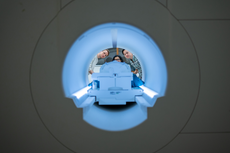Coma patients may experience fleeting consciousness seconds before death, study finds
Patients whose life support was removed showed surge of ‘gamma’ brain activity linked with consciousness
Strange brain wave patterns found in dying comatose patients suggest they may experience a fleeting conscious-like state moments before their death.
Numerous historical anecdotes and studies have shed light on cases of near death experiences in which people describe seeing a white light at the end of a tunnel, hearing voices or visits from departed loved ones.
Scientists have wondered whether the common elements across these experiences hint at a fundamental biological process underpinning them.
The new study, published on Monday in the journal PNAS, provides early evidence of a surge of brain activity correlated with consciousness in dying comatose patients.
“How vivid experience can emerge from a dysfunctional brain during the process of dying is a neuroscientific paradox,” study co-author George Mashour from the University of Michigan in the US said in a statement.
In the research, scientists identified four comatose and unresponsive patients who died due to cardiac arrest in the hospital while under EEG brain activity monitoring.
The patients were determined to be beyond medical help and, with their families’ permission, removed from life support.
When ventilator support was removed, two of the patients showed an increase in heart rate along with a surge of “gamma” brain wave activity, considered the fastest brain activity and associated with consciousness.
Researchers also detected activity in the brain’s so-called “hot zone” of neural correlates of consciousness – the junction between the temporal, parietal and occipital lobes present in the back of the brain.
Previous studies have found this brain area to be linked with dreaming, visual hallucinations in epilepsy and altered states of consciousness in other brain studies.
While the two patients had previous reports of seizures, none were observed during the hour before their deaths.
The other two patients, according to scientists, did not display the same increase in heartrate upon removal from life support nor did they have increased brain activity.
Since the sample size of the study was very small, researchers caution against making conclusive remarks about the implications of the research, but added that the findings are “definitely exciting” and provide a new framework for understanding of consciousness in dying humans.
It is also impossible to know exactly what the patients experienced since they did not survive.
The latest research follows a landmark study last year involving a dying person’s brain activity that revealed patterns around the time of death similar to those during dreaming and memory recall.
In this study, scientists were analysing the brain waves of an 87-year-old epilepsy patient for seizures using an EEG device, but the patient had a heart attack and died in the middle of the research.
An analysis of the EEG recordings revealed that as the person was dying, there was an increase in gamma brain wave activity, leading to scientists speculating that the dying 87-year old may have been making a “last recall of life”.
“Given that cross-coupling between alpha and gamma activity is involved in cognitive processes and memory recall in healthy subjects, it is intriguing to speculate that such activity could support a last ‘recall of life’ that may take place in the near-death state,” researchers wrote in the previous study.
The latest findings also highlight the need to reevaluate role of the brain during cardiac arrest, scientists said.
Join our commenting forum
Join thought-provoking conversations, follow other Independent readers and see their replies
Comments


Bookmark popover
Removed from bookmarks